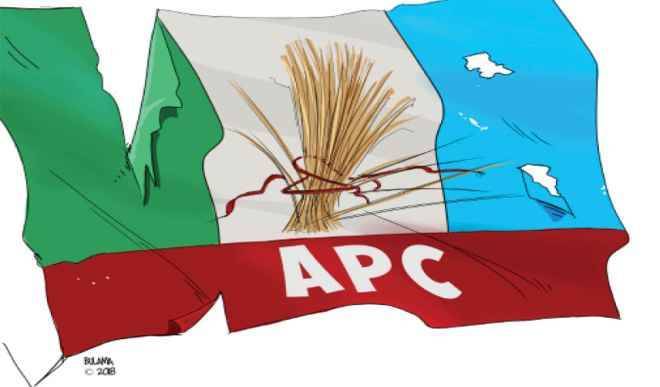The ruling All Progressives Congress (APC)’s National Executive Committee (NEC) meeting that took place in Abuja last Thursday managed to cool a boiling cauldron by dissolving the party’s crisis-torn National Working Committee [NWC] and installing a National Caretaker/Extra-ordinary Convention Planning Committee led by Yobe State Governor Mai Mala Buni.
Not, however, before the raging crises did a lot of damage to APC’s cohesion, its standing as the ruling party in Nigeria, its claim to be a congress of progressive politicians and its pre-2015 claim to be the agent of change in Nigeria.
Ideally, the crises that raged within APC in recent weeks was a matter only for the party’s members.
But since APC controls the Presidency, both chambers of the National Assembly and 20 state governments across the country [now down to 19], the crises within it affected all Nigerians.
It was a severe distraction from governance and it gave democracy and Nigeria as a whole a bad name in Africa and across the developing world.
There were always nascent factions and fissures in APC, some of them built around its original component political parties, others built around the 2023 ambitions of some of its leaders.
The latest national crisis, however, snowballed from a crisis in its Edo State chapter, where APC national chairman Adams Oshiomhole was engaged in a deadly political fight against his predecessor, Governor Godwin Obaseki.
There was a rash of court cases, suspensions, expulsions and counter-expulsions of national and state officers, splitting of Edo branch into factions, installation of some people as national officers outside the party’s rules, as well as prolonged failure to hold NEC meetings, which should have provided a check to the bitterly feuding NEC members.
In the end, Oshiomhole orchestrated the screening out of Obaseki from the Edo governorship primary, leading to the latter’s defection to PDP, followed by the Appeal Court ousting Oshiomhole based on suspension from his ward orchestrated by Obaseki.
Four different meneachmade claim to being the national chairman in place of Oshiomhole.
When party leader President Muhammadu Buhari finally intervened, he did so after much damage was done.
He also did so in a way that riled some combatants.
He accorded recognition to one of the chairmanship claimants, Victor Giadom, supposedly because of a court order but apparently because Giadom cooperated with Buhari’s intended “solution,” which was to oust Oshiomhole and the entire NWC.
18 of the 20 NWC members said the NEC meeting Giadom convened was illegal.
They questioned their ouster and threatened to go to court, but with APC state governors backing the deal, it looked like a solution had indeed been found to the APC crises, for now.
The new party chairman, Governor Mai Mala Buni, is a level headed man, unambitious, a total departure from the rambunctious Oshiomhole, and he has been doing very well in his current assignment as governor.
He also knows APC very well, as its former National Secretary.
He is therefore well positioned to calm frayed nerves, restore sanity in the party and organize a special convention within six months to elect new leaders.
A six month period for cooling tempers under a calm chairman will however not solve APC’s long term problems.
The battle of 2023 ambitions will resume right at the extraordinary convention.
Unless the party therefore finds a way to assert discipline, build ideological cohesion and firmly establish internal party democracy, its crises would probably continue and even worsen as 2023 approaches.
President Buhari too, must appreciate that these crises could severely damage his political and personal legacy.
He must not maintain his aloof posture to party matters and wait until things get out of hand before he intervenes.
APC is in danger of becoming an All Problems Congress.

 Join Daily Trust WhatsApp Community For Quick Access To News and Happenings Around You.
Join Daily Trust WhatsApp Community For Quick Access To News and Happenings Around You.


